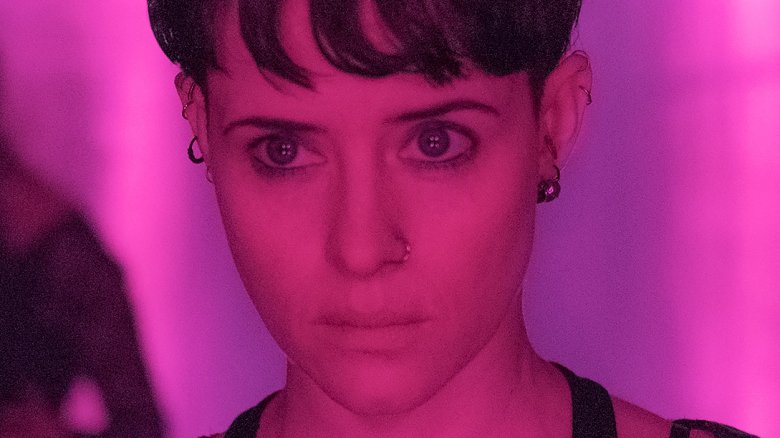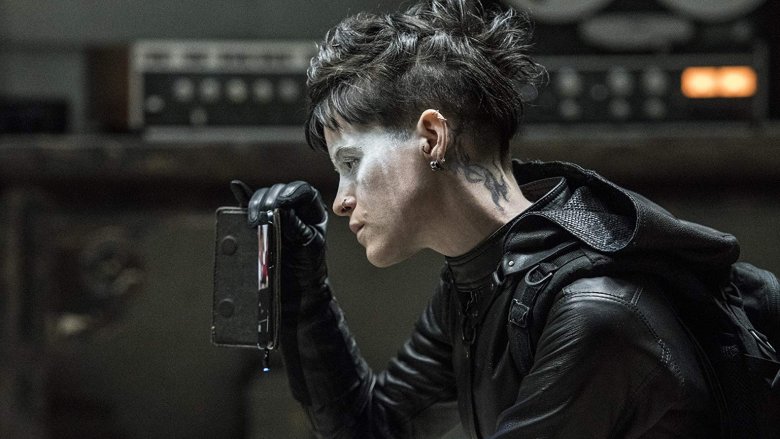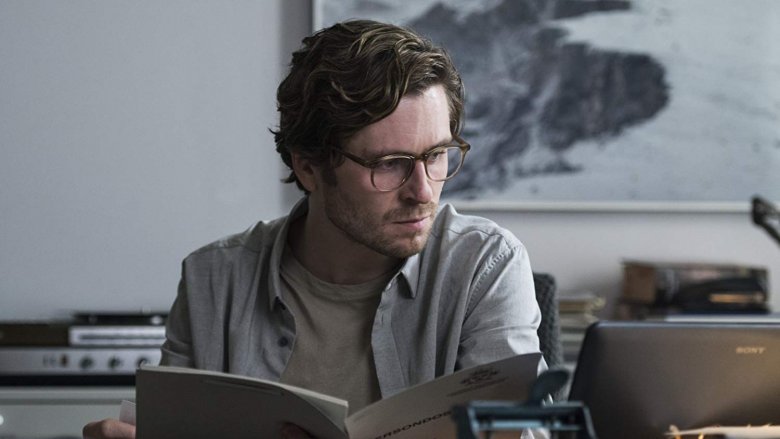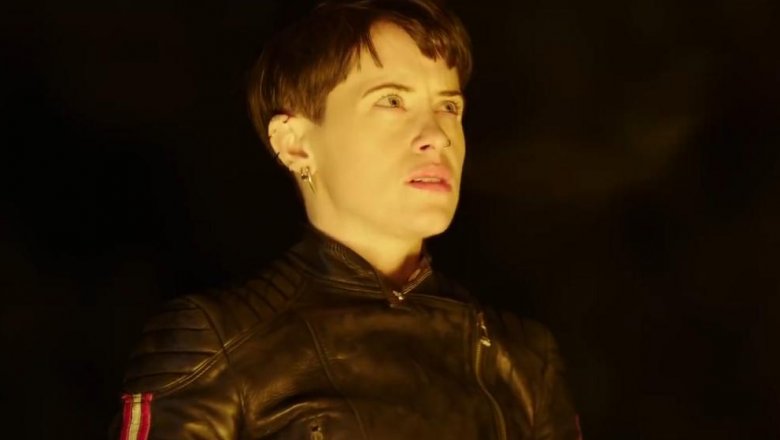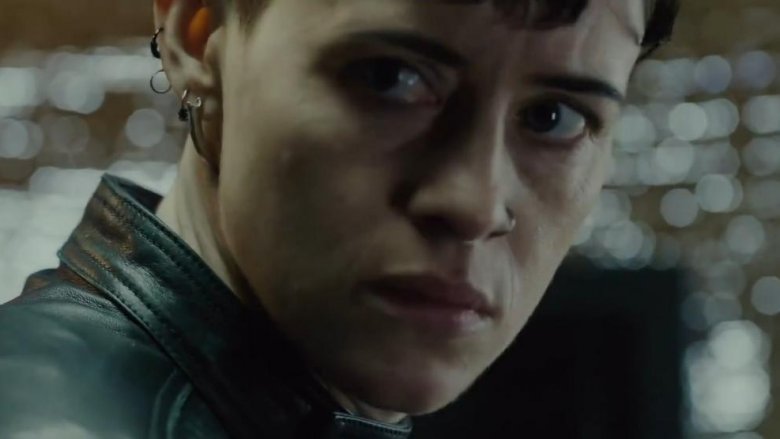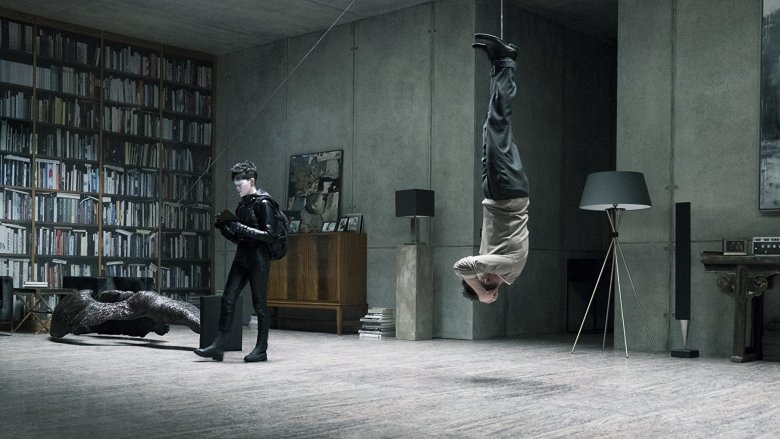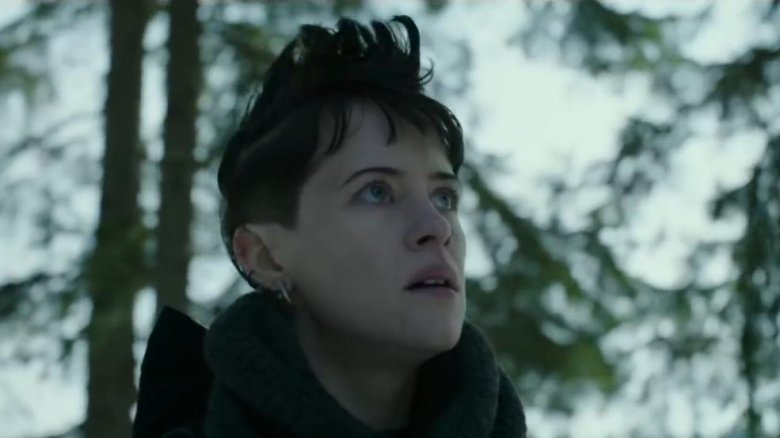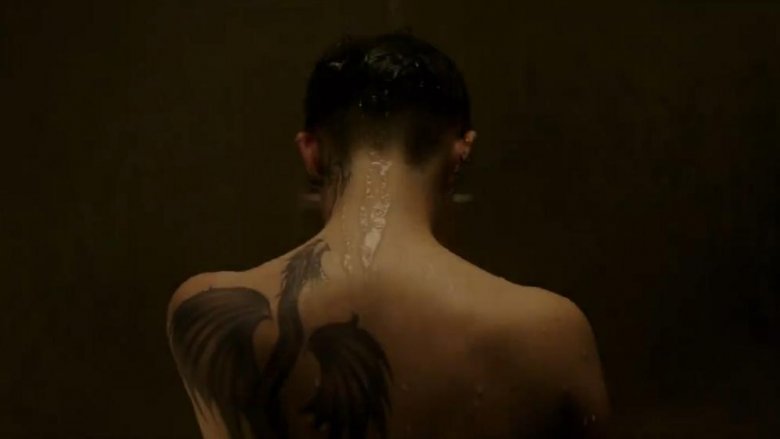Why The Girl In The Spider's Web Bombed At The Box Office
If you didn't get caught up in the spider's web over the course of November's second weekend, then you're not alone. For the most part, it looks like no one did. We're speaking, of course, of the Sony Pictures action thriller The Girl in the Spider's Web — also known as, thanks to a last-minute, seemingly-panicked subtitle addition, A New Dragon Tattoo Story.
A follow-up to the 2011 revenge movie The Girl with the Dragon Tattoo, the new story continues the adventures of the Swedish avenging hacker ninja Lisbeth Salander, brought to life by the late author Stieg Larsson in his worldwide hit, posthumously-published book series Millennium.
Directed by Fede Álvarez, the movie stars Claire Foy in the title role of the mercurial Salander, inhabiting a part that has previously been played by Rooney Mara in the English movie and Noomi Rapace in a trilogy of Swedish adaptations. With rotten reviews and a fifth-place debut, this new installment has all the makings of a series low, and may well spell the end of the Lisbeth Salander story onscreen. What went wrong? Let's unravel the tangled web, and sort out all the reasons this Girl bombed at the box office.
Clearing the board
Rather than pick up after the "not-quite-cliffhanger, but not-quite-closure" ending of David Fincher's 2011 The Girl with the Dragon Tattoo, this new story cleared the board for a whole new game. Instead of Rooney Mara and Daniel Craig in the roles of Lisbeth Salander and Mikael Blomkvist, the roles of the goth enigma and investigative journalist are played this time by Claire Foy and Sverrir Gudnason, respectively.
While recasting is often an understandable Hollywood reality, and not necessarily a dealbreaker, the move implies great distance between this movie and the film it serves as a sequel to. While technically a follow-up to Dragon Tattoo, the recasting implies a total reset — a new take on the material, with the new actors guaranteeing little continuity between this movie and its prequel.
While there's little wrong with Foy and Gudnason as actors — Foy's performance in particular has emerged as a consistent bright spot in the movie's reviews — they're coming into this project at a clear disadvantage, with the Fincher film generally having been regarded as well-cast. Even those who only saw James Bond in Craig's Blomkvist were forced to join the near-unanimous chorus in praise of Mara's truly alien, bizarre Salander — an off-putting protagonist with unusual but undeniable charisma.
Whole new everything
While the recasting of the lead actors gives Spider's Web an undeniable "straight-to-streaming sequel" patina, it's not the only personnel shift that has consequences. Virtually everyone behind the camera save for the production companies was replaced for the sequel, and while that probably went over the heads of general audiences, it likely caused a significantly more muted reaction to the movie among discerning cinephiles.
2011's The Girl with the Dragon Tattoo was directed by David Fincher, an acclaimed director who is by any metric one of the best filmmakers of his generation. If the name is unfamiliar to you, he's the stylist behind such films as Seven, Fight Club, Zodiac, The Social Network, and Gone Girl, all films that many craftsmen would simply kill to have in their filmography.
All his career, Fincher's been elevating pulpy material (such as sordid murder mysteries) up to a more artistically challenging, aesthetically gorgeous level. Fede Álvarez, who replaced Fincher, is certainly accomplished in his own right, with the well-received Evil Dead remake and Don't Breathe under his belt. Regardless, he can't help but suffer in comparison.
Whether a book or a movie, The Girl with the Dragon Tattoo has never been the most complex of stories — the appeal of Fincher's version was in the execution. There's simply less to get excited about with this adaptation.
The girl who failed to set the world on fire
While 2011's The Girl with the Dragon Tattoo has its champions — it's all but impossible to argue against the film's cinematography, direction, or score — the movie failed to become the franchise-starting sensation it was intended to be. Even at the time of its release, the movie was greeted with a muted response, and post-mortem looks back on the picture tend to characterize it as something of a quizzical disappointment.
While Fincher's Dragon Tattoo definitely made its money back at the global box office, bringing in over $232 million against a $90 million budget, the movie was not what you would call a franchise-starting sensation. Studios want that Venom money — why settle with doubling your investment when you could multiply it by six?
The soft performance of the original English Dragon Tattoo likely played a big part in bringing the series down to earth for its second installment, halving the budget and cutting the star power in order to make a movie that might have a chance of turning a bigger profit. But in the process of shaving down costs, producers seem to have also excised many of the elements that made that original work, resulting in a movie that's apparently not pleasing to anybody. Dragon Tattoo may not have set the world on fire, but after its opening weekend, Spider's Web seems doomed to do worse.
Cold reception
None of this would have mattered if The Girl in the Spider's Web had managed to deliver the goods when it comes to being a slick movie, but by most accounts, the movie doesn't pull it off. Rotten Tomatoes, counting 125 reviews, tabulates an average score of 43% for the movie, giving it a reputation as the worst-received film adaptation in the entire Millennium series. (It's gotten an even worse reception than the Swedish adaptation of The Girl who Kicked the Hornet's Nest, the courtroom drama that is easily the series' most boring story.)
Writing for the Chicago Reader with a scathing 1 out of 4 review, critic Noah Berlatsky portrayed the movie not just as a cynical, "predictable moneymaker" but as a betrayal of the original English movie's whole point. Where Salander was once a victim of trauma turning the tables on abusers, here she is "a kind of Batman figure" and "ninja superspy" who has lost everything that ever made her or her story sympathetic and interesting. Even more positive reviews for the movie tend to top off at calling it simply decent, lacking in complexity, sporting only surface-level cool.
A tonal shift
In both the David Fincher version and the trilogy of Noomi Rapace-led Swedish originals, Lisbeth Salander is a protagonist unlike any other. She's like a wounded bird, a tiny warrior at heart who defeats her opponents through cleverness and sheer tyranny of will, usually with a near-nihilistic sense of vengeance.
Foy's Salander, meanwhile, has been marketed in a markedly different way. In many respects, she's now a full-fledged, ultra-capable superheroine.
From the first trailer onward, the Salander of The Girl in the Spider's Web feels like a completely different sort of character — more Black Widow (or even James Bond) than the complex, ferocious waif at the center of the 2011 movie. Don't get us wrong, the Salander of that movie is still what gamers would call "OP" — wildly, insanely overpowered — but that's something that's just inherently true with every version of this wildly unrealistic character. (Never forget that the second book starts with Salander as a sexy millionaire criminal genius, reading a math book for fun during a tropical vacation while she ponders her new breast implants.)
The fact that the Spider's Web sequel also adds an equally capable supervillain sister to the mix only serves to emphasize how wildly unrelatable all of this material has become. It's also, in a pivot from the first English movie, clearly set up to center on Salander alone, rather than offer a two-handed story shared between herself and Blomkvist. (Unlike the adaptation, the book on which the movie's based gives roughly equal attention to both protagonists.)
October rollover
If you're reading this around the time of the movie's release, you're likely aware of the fact that October 2018 was a record-setting month of must-see movies. Perhaps you saw a few of them for yourself. There were honestly more movies released than we knew what to do with, with Venom, A Star is Born, and the 2018 edition of Halloween leading the pack with immense popularity.
The month was so saturated with quality movies that some better-than-average prestige contenders such as First Man more or less fell by the wayside, getting swept away by the parade of quality blockbusters. The month also saw the release of smaller, well-reviewed, more prestige movies to check out such as the Luca Guadagnino-directed Suspiria remake, the acclaimed YA adaptation The Hate U Give, and the Cabin in the Woods follow-up Bad Times at the El Royale. There are so quality many movies that hit theaters in October that we're honestly probably forgetting a few, and The Girl in the Spider's Web just hasn't proved attractive enough to dissuade filmgoers from taking a breather and playing catch-up instead.
Contested weekend
While October was a serious bloodbath at the box office, November 2018 didn't really let up on the throttle as the month began, with the Queen and Freddie Mercury biopic Bohemian Rhapsody making serious waves out of the gate. In its second weekend, the Bryan Singer-directed movie (well, sort of) brought in another $30 million, moving to second place at the box office after debuting as the number one movie in the U.S. Despite relatively middling reviews for the Rami Malek-led picture, it was a performance good enough to soundly defeat The Girl in the Spider's Web.
Not helping matters for the Millennium sequel are the other new releases from its debut weekend, including Overlord and The Grinch. While the family-friendly Dr. Seuss adaptation isn't exactly what you'd call direct competition for the dark, R-rated Spider's Web, the also-R-rated "Nazi zombies" movie Overlord definitely is.
That movie, a decently-received supernatural story with a unique concept and relatively unknown cast, managed to best the Dragon Tattoo follow-up quite handily in their head-to-head matchup, debuting to a $10 million gross as opposed to Spider's Web's $8 million. That's money that on any other weekend could've theoretically gone toward Spider's Web. While both movies are sporting a soft opening, Spider's Web did worse, getting seemingly no help from its recognizable name and intellectual property against the Nazi zombie onslaught.
End of the story?
So — where's the story going from here?
With worldwide earnings of $16 million in its opening weekend, The Girl in the Spider's Web still has a ways to go before it recoups its reported production budget of $43 million. Coupled with a marketing budget that's likely half of that number or more, Spider's Web would have needed to do four times as good in its opening weekend to make all of its money back out of the gate.
Now, with bad reviews and not much anticipated in the way of positive word of mouth, the movie will need to make its money back over the long run. Altogether, it's a performance that would seem to spell the end of this series on the big screen, at least for a little while.
Had Spider's Web proven successful, it likely would have brought new life to the franchise, with several books in the series still waiting for an English adaptation. There would've been the potential to go back and adapt variations on the second and third novels, which could have easily worked around the framework set up by Spider's Web, despite the ruptured chronology. Instead, it feels like this series may be well and truly done for now, leaving us with serious doubts that the series will trudge forward with Milllennium book five, The Girl who Takes an Eye for an Eye. Despite what feels like a timely message about female empowerment, it looks like Spider's Web is stuck.
